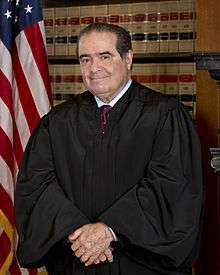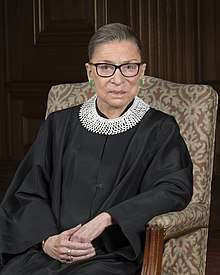Scalia v. Ginsburg
Scalia v. Ginsburg, sometimes known as Scalia/Ginsburg, is a 2015 comic opera by Derrick Wang about the relationship between Supreme Court of the United States Justices Antonin Scalia and Ruth Bader Ginsburg. It premiered at the Castleton Festival. Wang is both the composer and the librettist.[1] Wang's narrative mixes constitutional theory (originalism versus living constitutionalism) with important decisions of the U.S. Supreme Court,[2] and includes references to McCulloch v. Maryland (1819), Morrison v. Olson (1988), and Bush v. Gore (2000).[1] The music mixes "Verdi, Puccini, Christmas carols, 'The Star-Spangled Banner', and jazz."[1]
| Scalia v. Ginsburg | |
|---|---|
| Comic opera by Derrick Wang | |
| Librettist | Derrick Wang |
| Language | English |
| Premiere | 11 July 2015 Castleton Festival |


Synopsis
The comic opera is about the relationship between Supreme Court of the United States Justices Antonin Scalia and Ruth Bader Ginsburg.[2] The work balance the personalities of the two justices, Scalia's bombastic temperament versus Ginsburg's more demure nature,[3] reflects their public disagreements versus their private friendship,[4] and highlights their shared love of opera.[5] The two justices often dined and attended the opera together,[6] and performed as supernumeraries in a 1994 Washington National Opera production of Ariadne auf Naxos.[7]
The play starts in the Supreme Court Building with Scalia confronted in the courtroom by the "Commentator". The Commentator has supernatural powers and seals the room, stating "No man shall enter." Once the room is sealed, Scalia is forced to defend his approach to the law and may only escape by passing three trials. Ginsburg, not a man, breaks into the courtroom to defend her friend Scalia and insists on taking the trials alongside him. The opera ends after the two undergo the trials together.[1]
Roles and their creators
- Ellen Wieser (soprano) as Justice Ruth Bader Ginsburg[1]
- John Overholt (tenor) as Justice Antonin Scalia[1]
- Adam Cioffari (bass-baritone) as the Commentator[2]
See also

References
- Lat, David. "ATL Opera Review: Scalia/Ginsburg". Above the Law. Retrieved February 16, 2020.
- Kennicott, Philip (July 12, 2015). "'Scalia/Ginsburg': An affectionate comic opera look at the high court". The Washington Post. ISSN 0190-8286. Retrieved February 16, 2020.
- Totenberg, Nina (July 10, 2015). "Judicial Differences Take Center Stage In 'Scalia V. Ginsburg'". All Things Considered. NPR. Retrieved February 16, 2020.
- "Antonin Scalia Serenades Ruth Bader Ginsburg Over Gay Marriage With Bob Dylan Song". HuffPost. Reuters. October 8, 2015. Retrieved February 16, 2020.
- Totenberg, Nina (July 10, 2013). "Scalia V. Ginsburg: Supreme Court Sparring, Put to Music". All Things Considered. NPR. Retrieved February 16, 2020.
- Biskupic, Joan (August 24, 2009). "Ginsburg, Scalia Strike a Balance". USA Today. Archived from the original on January 17, 2008. Retrieved July 23, 2020.
- Ginsburg, Ruth Bader (July 13, 2015). "My First Opera". Opera America. Retrieved July 23, 2020.
External links
- Swed, Mark (July 13, 2015). "'Scalia/Ginsburg' opera underscores how opposites can be in harmony". Los Angeles Times.
- Wang, Derrick (February 16, 2015). "Scalia/Ginsburg: A (Gentle) Parody of Operatic Proportions". Journal of Law and Arts: 239–292. doi:10.7916/jla.v38i2.2119. Archived (PDF) from the original on June 24, 2015. Retrieved August 16, 2020.